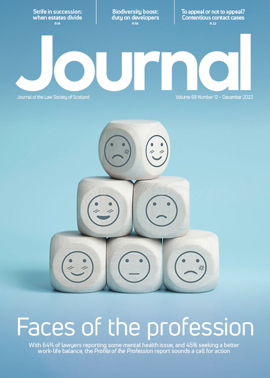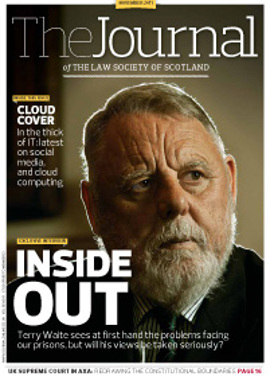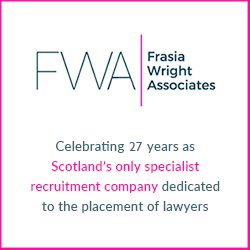Beware what you register
At Registers of Scotland, we are privileged to see a host of information pass through our doors and sometimes my colleagues see something which gives slight cause for concern. One such matter was raised recently by my registration colleagues who spotted that some information contained in a particular document went beyond what was perhaps considered appropriate for release into a public register.
The issue relates to a particular level of personal information being registered in the Books of Council & Session.
The example was a separation agreement which narrated details of the husband’s pension, but also included his national insurance number. The individual was, of course, fully designed in the document, so full name and address were also available.
The concern here is whether this combination of information should be registered in a public register and, indeed, whether it was being registered without the individuals being fully aware that it would be held in a public register.
It is really for the agents acting for individuals to advise on this or take appropriate measures before the document is sent for registration, because there is no authority on either the Keeper or National Archives of Scotland to redact personal information once these documents are submitted.
Government guidance
The Scottish Government has produced guidance for public bodies called “Data Handling in Government”, which is publicly available. You can find it at www.scotland.gov.uk/Resource/Doc/229747/0062215.pdf Although the document is aimed at public bodies, the guidance is generally useful and Annex B provides a helpful ready-reckoner for the combinations of information which may be categorised as protected.
At present, the risk of such personal information which is registered in the Books of Council & Session falling into the wrong hands may be considered low, as not all separation agreements would contain this information and anyone searching the register would have to know that a particular named couple had entered into such an agreement in order to retrieve it. However, if search criteria are widened in future, and if all of this is done online electronically, there may be an issue.
ARTL update – as at 22 October 2011
- 48,798 transactions have taken place
- 676 solicitors’ firms are currently on the ARTL system
- 29 lenders are currently on the ARTL system
- 13 local authorities are using the system.
From 4 July 2011, ARTL can process applications containing a transfer with a value of more than £1 million.
For up-to-date information and a full list of participating practices and companies, go to: ros.gov.uk/artl
Registers of Scotland is encouraging voluntary applications for registration in the Land Register: see www.journalonline.co.uk/Magazine/56-10/1010324.aspx
In this issue
- The role for pro bono
- Rectifying trusts – a Scottish perspective
- Squeezing capital claims
- The many faces of mortgage fraud
- Welcome break or cause for concern?
- Opinion
- Reading for pleasure
- Book reviews
- Council profile
- President's column
- Beware what you register
- Justice inside and out
- Auto-enrolment: are you prepared?
- Power and authority
- Refining the message
- Seeing through the cloud
- Don't drag out child cases
- Up to the job?
- Permanence changes
- LGPS: sea change again
- Scottish Solicitors' Discipline Tribunal
- ILG takes on risk
- Real burdens revived
- Practical limitations
- CPD: how to comply
- Law reform update
- The learning curve
- Ask Ash
- Inside story








